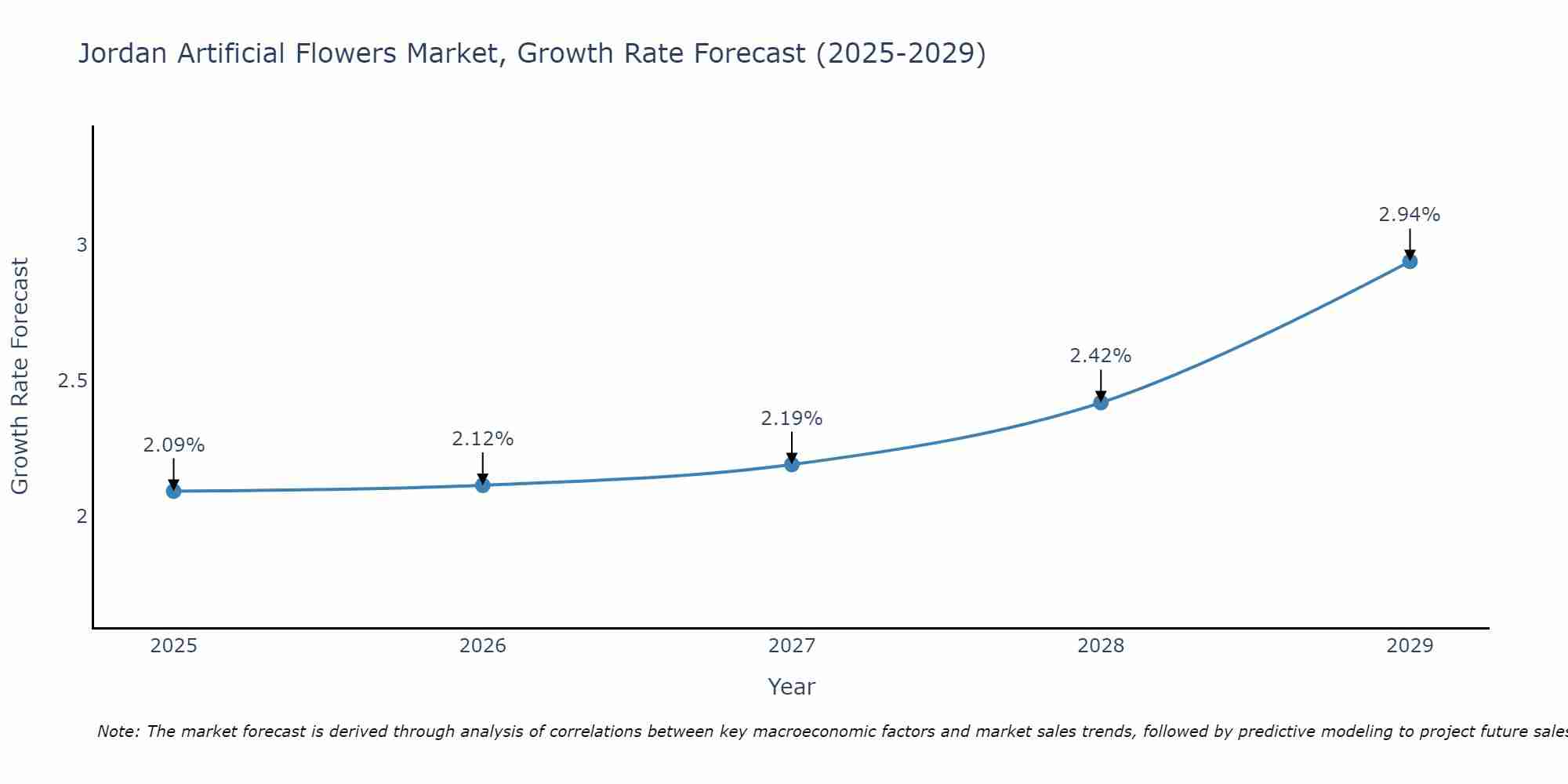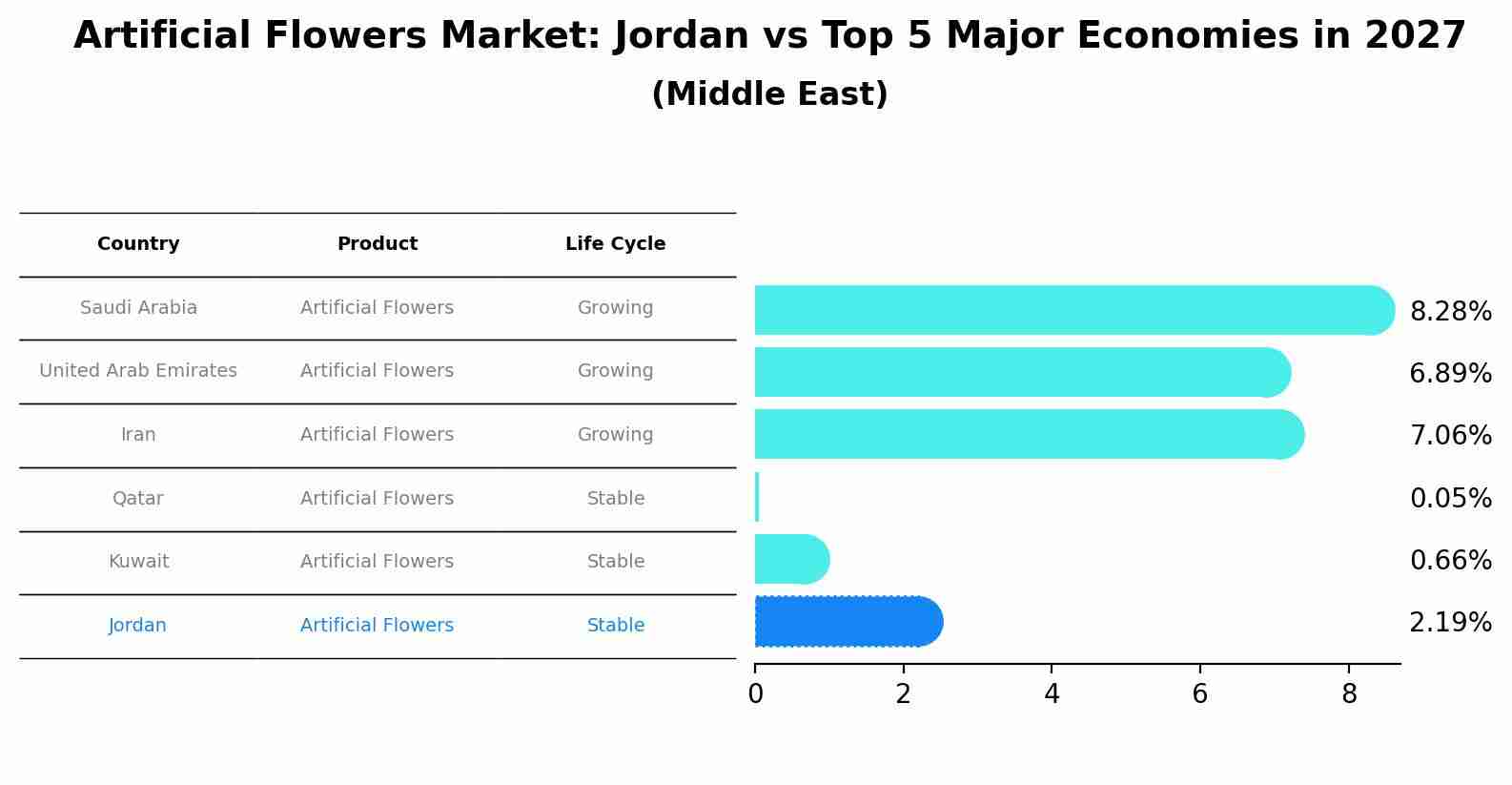Jordan Artificial Flowers Market (2025-2031) Outlook | Value, Growth, Size, Share, Revenue, Analysis, Companies, Forecast, Trends & Industry
| Product Code: ETC380206 | Publication Date: Aug 2022 | Updated Date: Jul 2025 | Product Type: Market Research Report | |
| Publisher: 6Wresearch | Author: Vasudha | No. of Pages: 75 | No. of Figures: 35 | No. of Tables: 20 |
Jordan Artificial Flowers Market Size Growth Rate
The Jordan Artificial Flowers Market is likely to experience consistent growth rate gains over the period 2025 to 2029. Commencing at 2.09% in 2025, growth builds up to 2.94% by 2029.

Artificial Flowers Market: Jordan vs Top 5 Major Economies in 2027 (Middle East)
The Artificial Flowers market in Jordan is projected to grow at a stable growth rate of 2.19% by 2027, highlighting the country's increasing focus on advanced technologies within the Middle East region, where Saudi Arabia holds the dominant position, followed closely by United Arab Emirates, Iran, Qatar and Kuwait, shaping overall regional demand.

Jordan Artificial Flowers Market Synopsis
The Jordan artificial flowers market is experiencing steady growth due to the increasing demand for long-lasting and low-maintenance floral décor solutions. Artificial flowers are becoming popular in both residential and commercial settings, including homes, offices, restaurants, and event venues. The market offers a wide range of artificial flower options, including silk, plastic, and foam-based materials, catering to various preferences and budgets. Key factors driving market growth include the growing trend of sustainable and eco-friendly products, the desire for year-round floral décor, and the availability of high-quality artificial flowers that closely resemble real blooms. The market is characterized by the presence of both local retailers and international brands, providing consumers with diverse choices and styles to enhance their living and working spaces with beautiful and durable floral arrangements.
Jordan Artificial Flowers Market Trends
In the Jordan Artificial Flowers Market, there is a notable trend towards eco-friendly and sustainable products. Consumers are increasingly seeking artificial flowers made from recycled materials or biodegradable components to reduce environmental impact. Additionally, there is a growing demand for realistic-looking artificial flowers that mimic fresh blooms closely, as consumers are looking for long-lasting and low-maintenance floral décor options. Customization and personalization options are also gaining popularity, allowing customers to create unique arrangements tailored to their preferences. Online sales of artificial flowers are on the rise, with e-commerce platforms offering a wide variety of choices and convenient delivery options. Overall, the market is seeing a shift towards more environmentally conscious and customizable artificial flower products to meet evolving consumer preferences.
Jordan Artificial Flowers Market Challenges
In the Jordan artificial flowers market, one of the key challenges faced by retailers and manufacturers is the competition from cheaper imported artificial flowers, particularly from countries with lower production costs. This can make it difficult for local businesses to compete on price, potentially impacting their profitability and market share. Additionally, ensuring a consistent supply of high-quality artificial flowers that meet consumer preferences and trends can be challenging, as it requires close monitoring of market demands and quick adaptation to changing styles. Furthermore, issues related to environmental concerns and sustainability are becoming increasingly important in the artificial flowers market, posing a challenge for companies to source materials and production methods that are eco-friendly and socially responsible while remaining cost-effective.
Jordan Artificial Flowers Market Investment Opportunities
The Jordan artificial flowers market presents several promising investment opportunities. With a growing demand for decorative items and an increasing preference for low-maintenance and long-lasting decor, artificial flowers have gained popularity in the region. Investors can tap into this market by offering a variety of high-quality artificial flowers in different designs, colors, and sizes to cater to diverse consumer preferences. Additionally, there is potential for expansion into online sales platforms to reach a wider customer base beyond local markets. Collaborating with event planning companies, home decor stores, and interior designers can also be beneficial for establishing a strong presence in the market. Overall, investing in the Jordan artificial flowers market offers the potential for growth and profitability in a sector that is witnessing increasing consumer interest.
Jordan Agar Market Government Policies
The Jordanian government has specific policies in place regarding the artificial flowers market. These policies regulate the importation of artificial flowers to ensure they meet quality standards and do not pose health or environmental risks. Additionally, the government imposes tariffs and taxes on artificial flower imports to protect local producers and encourage domestic production. The government may also provide subsidies or incentives to support local artificial flower businesses and promote growth in the sector. Overall, the government`s policies aim to balance the importation of artificial flowers with the support and development of the local industry in Jordan.
Jordan Artificial Flowers Market Future Outlook
The future outlook for the Jordan Artificial Flowers Market appears positive, driven by factors such as increasing demand for low-maintenance and long-lasting floral decorations, along with a growing preference for sustainable and eco-friendly alternatives to real flowers. Furthermore, the market is expected to benefit from the rising popularity of artificial flowers in various events and occasions, including weddings, parties, and corporate events. Technological advancements in manufacturing processes are also likely to lead to the development of more realistic and high-quality artificial flowers, attracting a wider customer base. With a combination of changing consumer preferences and innovative product offerings, the Jordan Artificial Flowers Market is poised for steady growth in the coming years.
Key Highlights of the Report:
- Jordan Artificial Flowers Market Outlook
- Market Size of Jordan Artificial Flowers Market, 2024
- Forecast of Jordan Artificial Flowers Market, 2031
- Historical Data and Forecast of Jordan Artificial Flowers Revenues & Volume for the Period 2021 - 2031
- Jordan Artificial Flowers Market Trend Evolution
- Jordan Artificial Flowers Market Drivers and Challenges
- Jordan Artificial Flowers Price Trends
- Jordan Artificial Flowers Porter's Five Forces
- Jordan Artificial Flowers Industry Life Cycle
- Historical Data and Forecast of Jordan Artificial Flowers Market Revenues & Volume By Material Type for the Period 2021 - 2031
- Historical Data and Forecast of Jordan Artificial Flowers Market Revenues & Volume By Clay & Porcelain for the Period 2021 - 2031
- Historical Data and Forecast of Jordan Artificial Flowers Market Revenues & Volume By Cotton & Silk for the Period 2021 - 2031
- Historical Data and Forecast of Jordan Artificial Flowers Market Revenues & Volume By Leather & Nylon for the Period 2021 - 2031
- Historical Data and Forecast of Jordan Artificial Flowers Market Revenues & Volume By Paper & Wax for the Period 2021 - 2031
- Historical Data and Forecast of Jordan Artificial Flowers Market Revenues & Volume By Plastic & Polyester for the Period 2021 - 2031
- Historical Data and Forecast of Jordan Artificial Flowers Market Revenues & Volume By Application for the Period 2021 - 2031
- Historical Data and Forecast of Jordan Artificial Flowers Market Revenues & Volume By Commercial for the Period 2021 - 2031
- Historical Data and Forecast of Jordan Artificial Flowers Market Revenues & Volume By Residential for the Period 2021 - 2031
- Jordan Artificial Flowers Import Export Trade Statistics
- Market Opportunity Assessment By Material Type
- Market Opportunity Assessment By Application
- Jordan Artificial Flowers Top Companies Market Share
- Jordan Artificial Flowers Competitive Benchmarking By Technical and Operational Parameters
- Jordan Artificial Flowers Company Profiles
- Jordan Artificial Flowers Key Strategic Recommendations
Frequently Asked Questions About the Market Study (FAQs):
- Single User License$ 1,995
- Department License$ 2,400
- Site License$ 3,120
- Global License$ 3,795
Search
Thought Leadership and Analyst Meet
Our Clients
Related Reports
- Canada Oil and Gas Market (2026-2032) | Share, Segmentation, Value, Industry, Trends, Forecast, Analysis, Size & Revenue, Growth, Competitive Landscape, Outlook, Companies
- Germany Breakfast Food Market (2026-2032) | Industry, Share, Growth, Size, Companies, Value, Analysis, Revenue, Trends, Forecast & Outlook
- Australia Briquette Market (2025-2031) | Growth, Size, Revenue, Forecast, Analysis, Trends, Value, Share, Industry & Companies
- Vietnam System Integrator Market (2025-2031) | Size, Companies, Analysis, Industry, Value, Forecast, Growth, Trends, Revenue & Share
- ASEAN and Thailand Brain Health Supplements Market (2025-2031) | Strategy, Consumer Insights, Analysis, Investment Trends, Opportunities, Growth, Size, Share, Industry, Revenue, Segments, Value, Segmentation, Supply, Forecast, Restraints, Outlook, Competition, Drivers, Trends, Demand, Pricing Analysis, Competitive, Strategic Insights, Companies, Challenges
- ASEAN Bearings Market (2025-2031) | Strategy, Consumer Insights, Analysis, Investment Trends, Opportunities, Growth, Size, Share, Industry, Revenue, Segments, Value, Segmentation, Supply, Forecast, Restraints, Outlook, Competition, Drivers, Trends, Demand, Pricing Analysis, Competitive, Strategic Insights, Companies, Challenges
- Europe Flooring Market (2025-2031) | Outlook, Share, Industry, Trends, Forecast, Companies, Revenue, Size, Analysis, Growth & Value
- Saudi Arabia Manlift Market (2025-2031) | Outlook, Size, Growth, Trends, Companies, Industry, Revenue, Value, Share, Forecast & Analysis
- Uganda Excavator, Crane, and Wheel Loaders Market (2025-2031) | Strategy, Consumer Insights, Analysis, Investment Trends, Opportunities, Growth, Size, Share, Industry, Revenue, Segments, Value, Segmentation, Supply, Forecast, Restraints, Outlook, Competition, Drivers, Trends, Demand, Pricing Analysis, Competitive, Strategic Insights, Companies, Challenges
- Rwanda Excavator, Crane, and Wheel Loaders Market (2025-2031) | Strategy, Consumer Insights, Analysis, Investment Trends, Opportunities, Growth, Size, Share, Industry, Revenue, Segments, Value, Segmentation, Supply, Forecast, Restraints, Outlook, Competition, Drivers, Trends, Demand, Pricing Analysis, Competitive, Strategic Insights, Companies, Challenges
Industry Events and Analyst Meet
Whitepaper
- Middle East & Africa Commercial Security Market Click here to view more.
- Middle East & Africa Fire Safety Systems & Equipment Market Click here to view more.
- GCC Drone Market Click here to view more.
- Middle East Lighting Fixture Market Click here to view more.
- GCC Physical & Perimeter Security Market Click here to view more.
6WResearch In News
- Doha a strategic location for EV manufacturing hub: IPA Qatar
- Demand for luxury TVs surging in the GCC, says Samsung
- Empowering Growth: The Thriving Journey of Bangladesh’s Cable Industry
- Demand for luxury TVs surging in the GCC, says Samsung
- Video call with a traditional healer? Once unthinkable, it’s now common in South Africa
- Intelligent Buildings To Smooth GCC’s Path To Net Zero


















